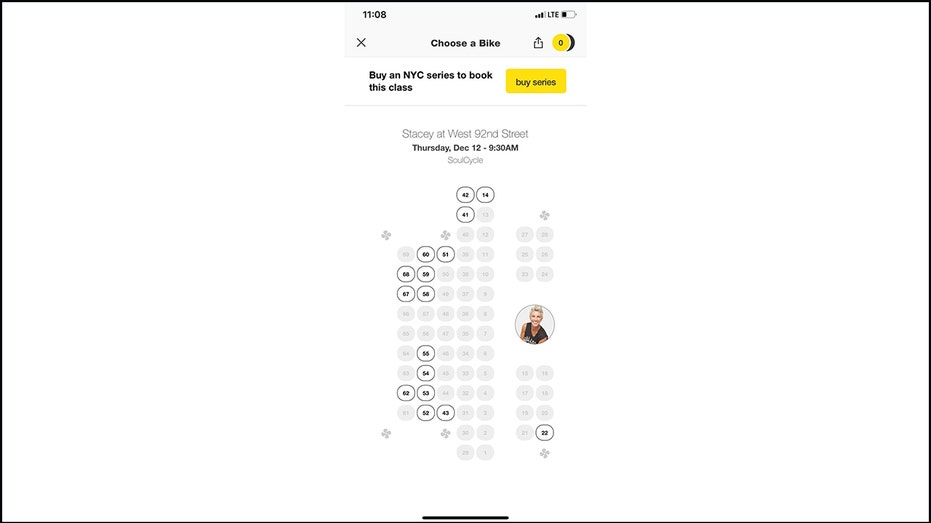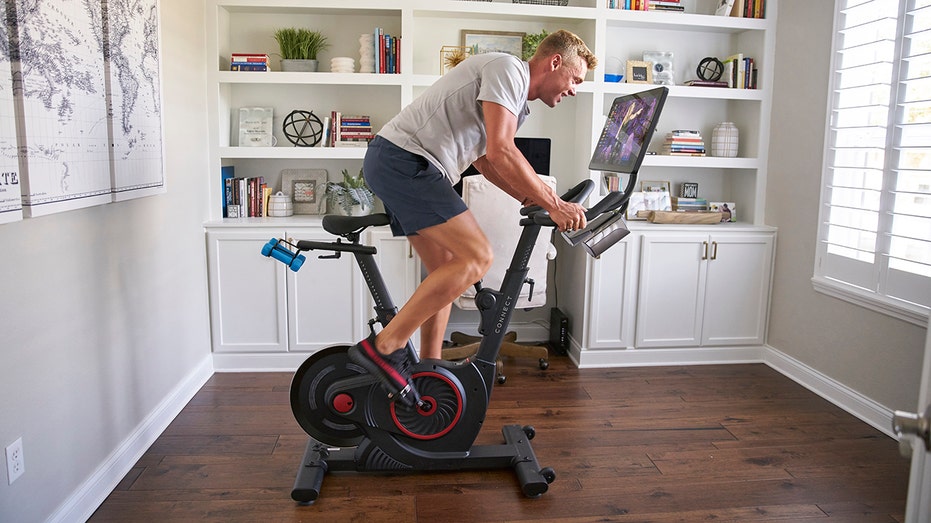Cycling studios sweat competition from Peloton and home fitness programs
Peloton, Mirror and Echelon Fit threaten to put the brakes on boutique fitness studios
Fitness fans used to sweat the process of getting into a SoulCycle class with their favorite spin instructors.
“I would literally set my alarm every Monday at noon. It was anxiety-inducing,” Allie Lewbel, 32, the founder of New York-based event planning company told FOX Business. Classes would book up in seconds when she would sign up in recent years. “Now you can book the night before.”
More than a dozen open spin bikes were available for celebrity spin instructor Stacey Griffith’s morning class on New York City’s Upper West Side on Thursday when FOX Business checked Wednesday afternoon. An open bike in Griffith’s classes, where stars like Madonna, Brooke Shields, and Kelly Ripa would join in on her upbeat choreography, was nearly impossible to book five years ago.

Some SoulCycle riders report it's easier than ever to book a bike with master instructors
GET FOX BUSINESS ON THE GO BY CLICKING HERE
As fitness programs become more and more digitized, consumers seem to be prioritizing working out at home or outside with fitness trackers more often. Market research firm Euromonitor International surveyed 15,301 participants this year, asking them which types of exercise they typically do. Thirty-six percent said they work out at home, while just 12.75 percent surveyed said they do a group fitness class. Hiking and walking were the No. 1 exercise with 53 percent of participants saying it’s their preferred workout.
“The fitness industry changed a lot over the last year; with the onset of at-home workout services, they have mitigated the stress of having to sign up at the right time for those sought-after classes," said John Ford, CEO of eGym North America, a digital fitness company. "Consumers have more access to fitness programs than before."
PELOTON COMMERCIAL HUSBAND: I DON'T SEE THE SEXISM
At-home fitness equipment from brands like Peloton and Mirror are leading the trend. Peloton, the fitness company that sells exercise bikes and treadmills with subscription-based workouts for upward of $2,000, has more than 1.5 million members paying $39 a month in addition to equipment costs to live stream workouts at home. It recently lowered the price of its digital-only subscription service to $12.99 a month, down from $19.99, to appeal to the masses who may not be able to splurge thousands of dollars on a bike. And more recently, Peloton started offering free 30-minute walk-in rides at its New York City studios up to three times a day, including during peak exercise times for the after-work crowd at 5:15 p.m.
Similarly, New York City-based startup tech-startup Mirror, which launched in September 2018 with its LCD mirror that lets users stream live and on-demand fitness classes from home, secured $34 million in funding from investors, including Lululemon.
Sixty-one percent of people spend between $26 and $175 per month on fitness, according to a survey from ASweatLife.com, or a little less than what it costs to purchase one piece of Peloton equipment without its monthly subscription. Last year, 21 percent said they were spending money on digital fitness programs, twice as many people compared to 2016, according to the survey from ASweatLife, showing that more people are looking for affordably priced digitized fitness options.
Echelon Fit, another at-home fitness company, is selling more accessibly priced at-home fitness equipment. It makes spin bikes and reflective mirrors along with rower machines. The “Connect” bike is $800, compared to Peloton's, which retails for $2,250. Sales year over year have increased by 300 percent, with its “Connect” bikes seeing a 25 percent sales increase this year.

Echelon Fit, another at-home fitness company, is selling more accessibly priced at-home fitness equipment like its "Connect" bike for $800. (Courtesy of Echelon Fit)
PELOTON'S CONTROVERSIAL HOLIDAY AD COSTS INVESTORS
| Ticker | Security | Last | Change | Change % |
|---|---|---|---|---|
| PTON | PELOTON INTERACTIVE INC. | 4.62 | +0.23 | +5.35% |
Ford says more people are looking for more convenient and customizable workout experiences.
"With the digitization of the industry, gyms and sports clubs are being forced to update their equipment to cater to the new tech-focused consumers who want to be able to do everything with the tap of their fingers," Ford said.




















